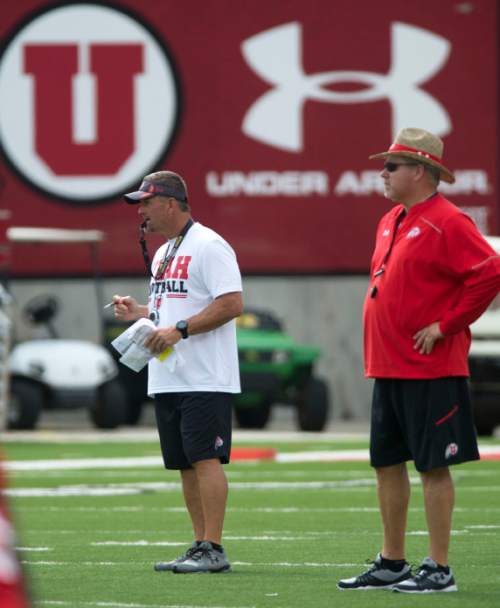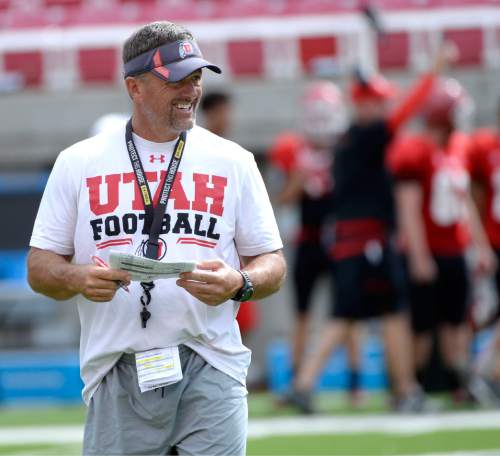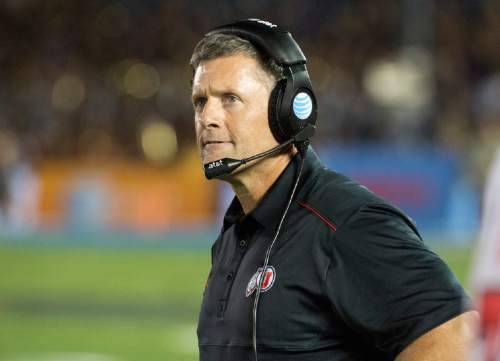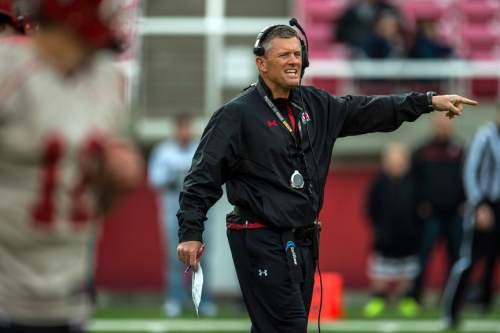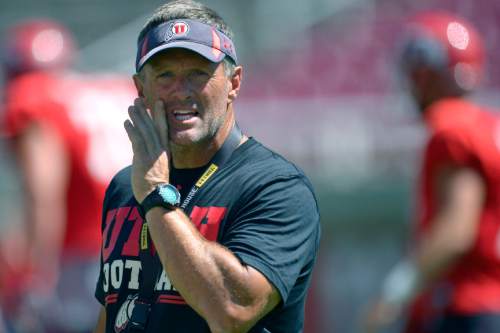This is an archived article that was published on sltrib.com in 2015, and information in the article may be outdated. It is provided only for personal research purposes and may not be reprinted.
Business as usual: Well, is it, or isn't it?
It's been a burning question ever since both of Utah's coordinators left for what were deemed by some to be lateral moves, and since Utah fans' holidays were further soured by reports that head coach Kyle Whittingham and athletic director Chris Hill were getting along less than famously.
When Whittingham made himself available to media this week, he was naturally asked about the cliche du jour:
Business as usual? It is, he said.
And there's obvious merit to his response.
For starters, Whittingham said that while many have waited for him to address the "drama," as he called it, he's been particularly busy, as he was while trying to replace coaches after previous successful seasons.
That's not out of the norm.
Only Gary Andersen stuck around after Utah's Fiesta Bowl win in 2005. After Utah's Sugar Bowl victory in 2009, Whittingham lost Andersen, his defensive coordinator, and offensive coordinator Andy Ludwig.
This offseason, it may be a tall order to find a coach as beloved by players as Andersen's replacement, Kalani Sitake, and it's as important as ever that Utah's eighth consecutive new offensive coordinator be, at last, a fit for the long haul.
Whittingham is going to take as long as he needs, he said. He's not going to be rushed by the approach of signing day on Feb. 4, or sky-is-falling punditry.
If Utah must recruit without a coordinator, or down a coach or three (defensive line coach Ilaisa Tuiaki accompanied Sitake to Corvallis)? So be it.
Meanwhile, remaining assistant coaches are hashing out recruiting strategy for when an NCAA-mandated dead period ends Wednesday, and out-of-state players are returning for the start of spring classes Monday.
That daily business all looks pretty darn usual.
But it's somewhat unusual business that such a high degree of external uncertainty clouds the program after a 9-4 season that seemed to put to bed doubts that Utah could succeed as a member of the Pac-12.
Before Whittingham spoke for the first time Wednesday night on CBS Radio, former players, team parents, current recruits and prospective assistants had sought the truth behind anonymously sourced reports and speculation - some resorting, even, to asking members of the media.
Whittingham said he felt it was unnecessary to release a statement of the obvious: that he remains Utah's head coach.
Doing so might've fanned the flames.
But there are a few things Whittingham can do to ease his fan base's anxiety without ever saying another word on the matter.
Foremost, obviously, he can stay.
If Whittingham hangs onto Utah's already-committed preps and finishes the recruiting season with a flourish or two, he will show that for the all-important "highly talented 16- to 18-year-old" demographic, the "drama" didn't rate.
And if he can further squash the perception problem by hiring three effective coaches - the American Football Coaches Association convention is this week in Louisville - and his agent can negotiate a contract extension, as Whittingham told 1320 AM's Tim Montemayor he is hopeful will happen, Utah will enter spring ball with a majority of its starters returning and as much momentum as they had after beating Colorado State 45-10 in the Las Vegas Bowl on Dec. 20.
If he manages all that, business won't just be usual.
Business will be good.
Twitter: @matthew_piper


